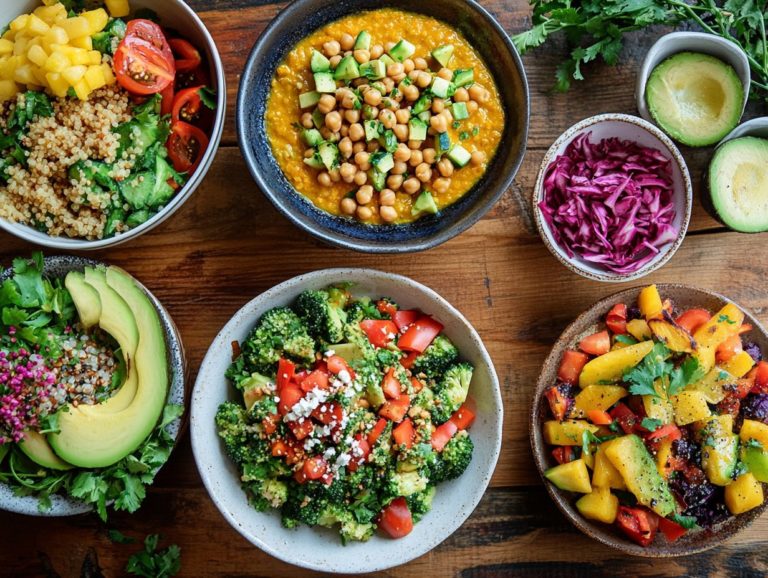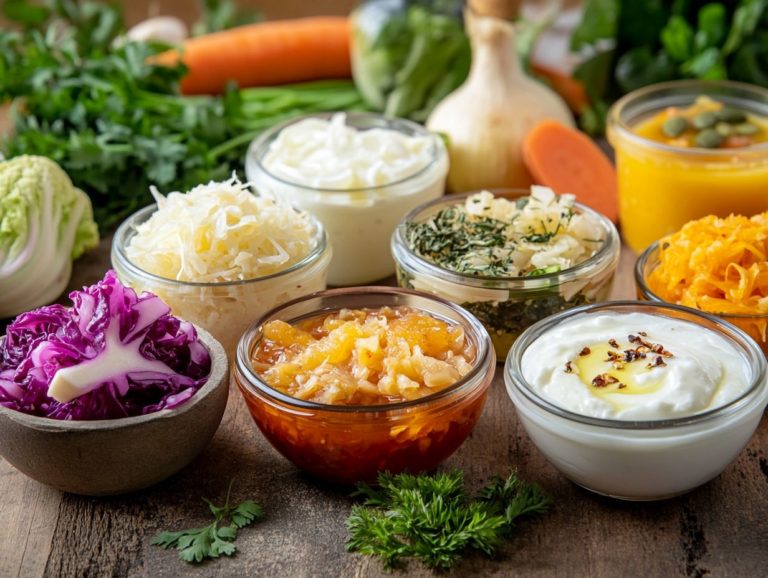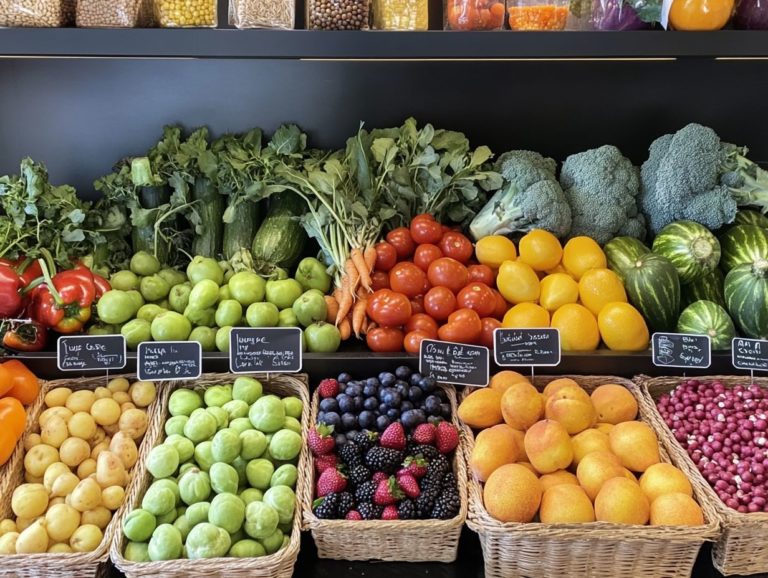Exploring Plant-Based Diets in Holistic Nutrition
Plant-based diets have captured significant attention lately, and for good reason. They offer numerous benefits, from enhancing your health to supporting environmental sustainability.
This article delves into what a plant-based diet truly encompasses. It emphasizes its potential for improved health outcomes and positive effects on the planet. You ll explore nutritional considerations to ensure you meet your nutrient needs while steering clear of common deficiencies.
Discover practical tips for transitioning to this lifestyle, along with meal ideas that make healthy eating enjoyable and satisfying. Embrace the transformative power of a plant-based diet and witness how it can positively impact your life and the world around you!
Contents
Key Takeaways:
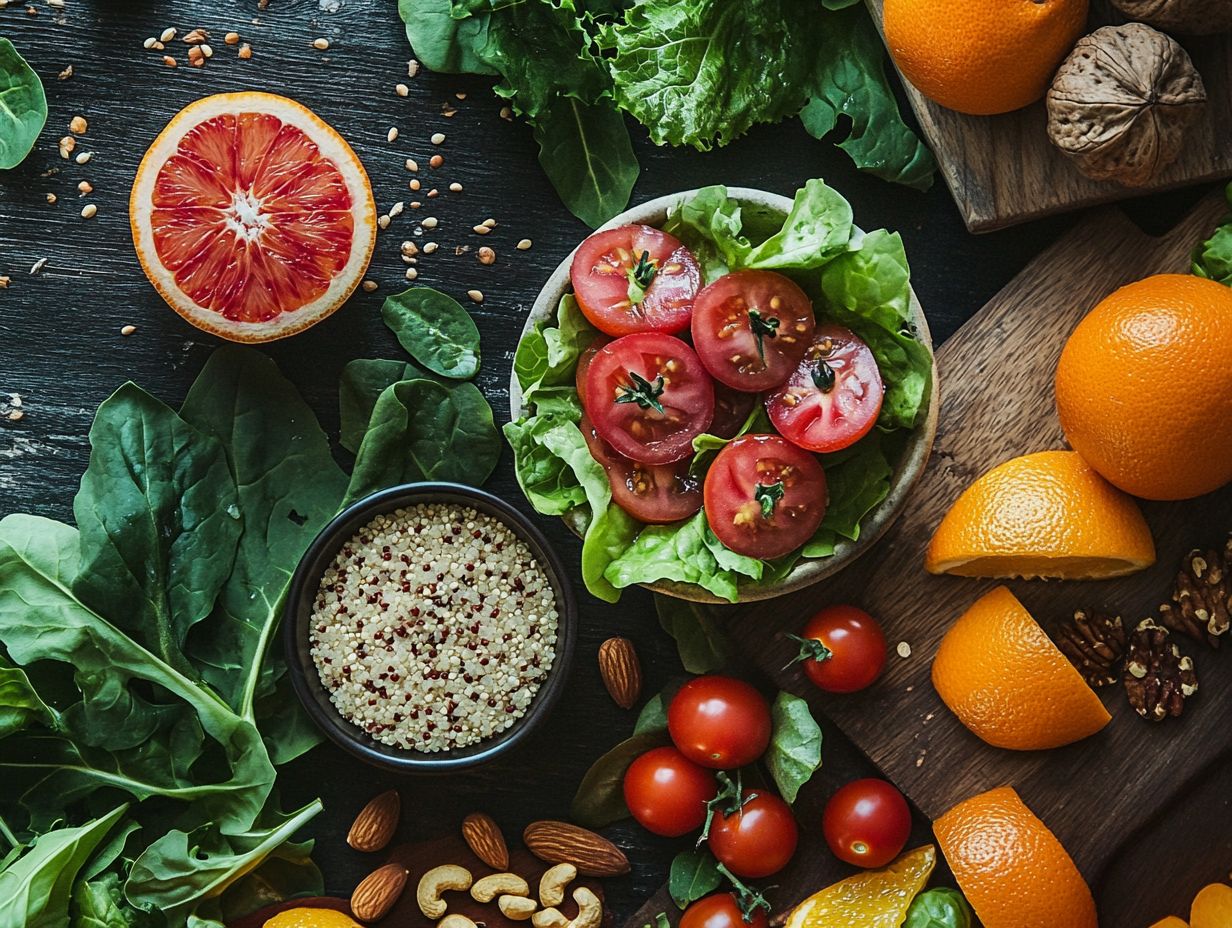
- Plant-based diets offer numerous health benefits and a positive environmental impact.
- Meeting nutrient needs can be achieved by incorporating a variety of plant-based foods and being mindful of common deficiencies.
- Transitioning can be easier with helpful tips, strategies for success, and delicious plant-based recipes.
Defining Plant-Based Diets
A plant-based diet encompasses a diverse range of eating patterns that prioritize foods derived from plants while minimizing or excluding animal products.
These options include both vegetarian and vegan lifestyles, emphasizing whole grains, legumes, vegetables, and nuts. These approaches are rooted in health guidelines that highlight the importance of nutrient-rich, minimally processed foods.
As this trend continues to grow, adopting a plant-based diet not only enhances your personal health but also contributes significantly to environmental sustainability and ethical considerations surrounding food choices.
The Benefits of a Plant-Based Diet
The advantages of adopting a plant-based diet are multi-faceted, providing remarkable health benefits along with significant environmental gains.
Numerous studies, including insights from The China Study, show that a diet rich in plant foods can help prevent chronic conditions such as cardiovascular disease, obesity, diabetes, and cancer.
Additionally, this lifestyle helps reduce reliance on animal products, nourishing both your body and the planet.
Improved Health Outcomes
Adopting a plant-based diet can lead to remarkably improved health outcomes. This diet is typically rich in high-fiber foods, protein sources, and essential calcium.
Reputable organizations like the Mayo Clinic and experts such as Donald D. Hensrud, M.D., indicate that those who embrace plant-based eating often enjoy lower cholesterol levels, better digestive health, and a reduced risk of chronic diseases.
Research in the Journal of the American Heart Association reveals that a plant-rich diet can significantly improve blood pressure, which lowers the risk of heart-related issues.
Foods like beans and legumes serve as excellent protein sources and help maintain healthy cholesterol levels. Incorporating calcium-rich options such as fortified plant milks and leafy greens is essential for bone health.
These dietary adjustments align well with the American Dietary Guidelines, which advocate for whole, unprocessed foods as the cornerstone of optimum health.
Environmental Impact
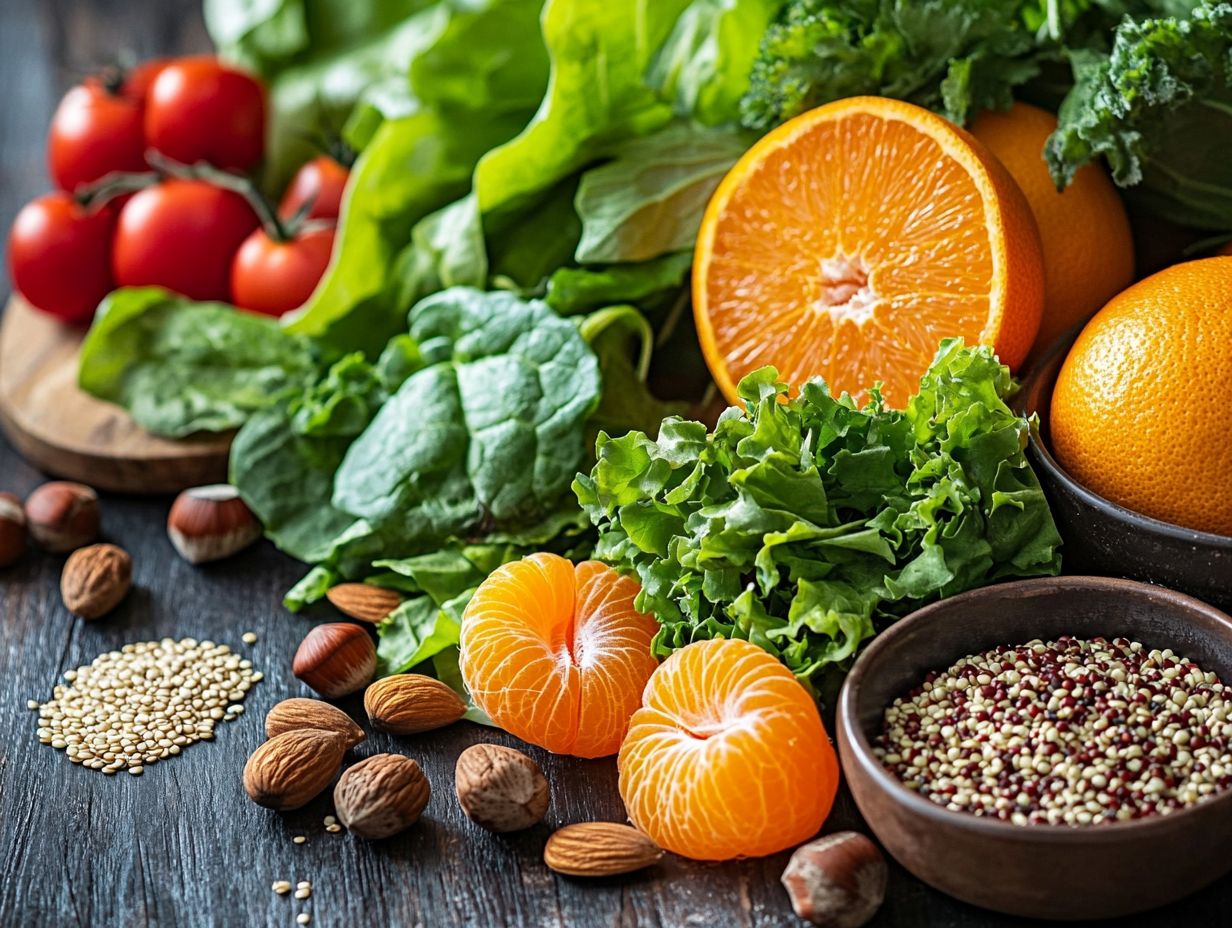
Adopting a plant-based diet can greatly reduce your carbon footprint. By consuming fewer animal products, you’re making a significant impact.
Choosing plant-based options not only leads to healthier food choices but also supports sustainability efforts that are vital in combating climate change and preserving natural resources.
This dietary shift is a powerful way to help the planet. Growing plants typically generates far less pollution than livestock farming, which means that your choices play an essential role in protecting the environment.
When you opt for plant-based foods, you also conserve precious water resources, as producing animal products often demands staggering amounts of water.
The broader implications of your choices send ripples through global food systems, promoting ecological balance and enhancing food affordability. As the demand for sustainable plant-based foods increases, economies of scale can lower prices, making healthy eating accessible to a larger population.
Ultimately, these conscious dietary choices contribute not only to your personal health but also to creating a more viable planet for future generations.
Nutritional Considerations
Nutritional considerations are crucial when you embrace a plant-based diet. Ensuring your dietary choices effectively meet all your nutrient needs is essential.
While it’s true that plant-based diets can supply sufficient protein and calcium, you must remain vigilant about common nutrient deficiencies. These include vitamin B12, iron, and omega-3 fatty acids, which tend to be less abundant in plant sources.
This calls for thoughtful meal planning and, in some cases, the incorporation of supplements to maintain optimal health.
Meeting Nutrient Needs on a Plant-Based Diet
Meeting your nutrient needs requires a thoughtful strategy that emphasizes variety. By choosing a range of foods, you can ensure you re getting enough essential proteins, calcium, vitamins, and minerals.
Incorporate diverse ingredients like grains, legumes, nuts, and leafy greens to create balanced meals that fulfill your nutritional requirements.
It’s crucial to focus on foods rich in specific nutrients. For instance, quinoa and lentils are excellent protein sources, while almonds and fortified plant milks provide a hefty dose of calcium.
Including a colorful array of fruits and vegetables will help you cover your bases for vitamins A, C, K, and important minerals like iron and magnesium.
Meal prep strategies, such as batch cooking grains and pre-chopping vegetables, can simplify your cooking routine. This way, incorporating a variety of ingredients into your meals throughout the week becomes effortless.
Planning your meals ahead not only helps you identify any nutrient gaps but also ensures you meet your dietary goals without stress.
Common Nutrient Deficiencies
Embracing a plant-based diet can lead to common nutrient deficiencies, particularly in vitamin B12, iron, and omega-3 fatty acids. It’s crucial to be aware of these gaps so you can take action now.
Vitamin B12 is essential for nerve function and the formation of red blood cells, and it’s primarily found in animal products. Iron is vital for oxygen transport, but its bioavailability in plant sources can be lower than that found in meat. Omega-3s support brain health and are predominantly sourced from fish, meaning you might be at risk on a plant-based diet.
To tackle these deficiencies, consider incorporating fortified foods, legumes, nuts, seeds, and dark leafy greens into your meals. A high-quality B12 supplement, iron-rich foods like lentils and chickpeas, and omega-3 sources such as flaxseeds or algae-based supplements can help you maintain a balanced and healthful approach.
How to Transition to a Plant-Based Diet
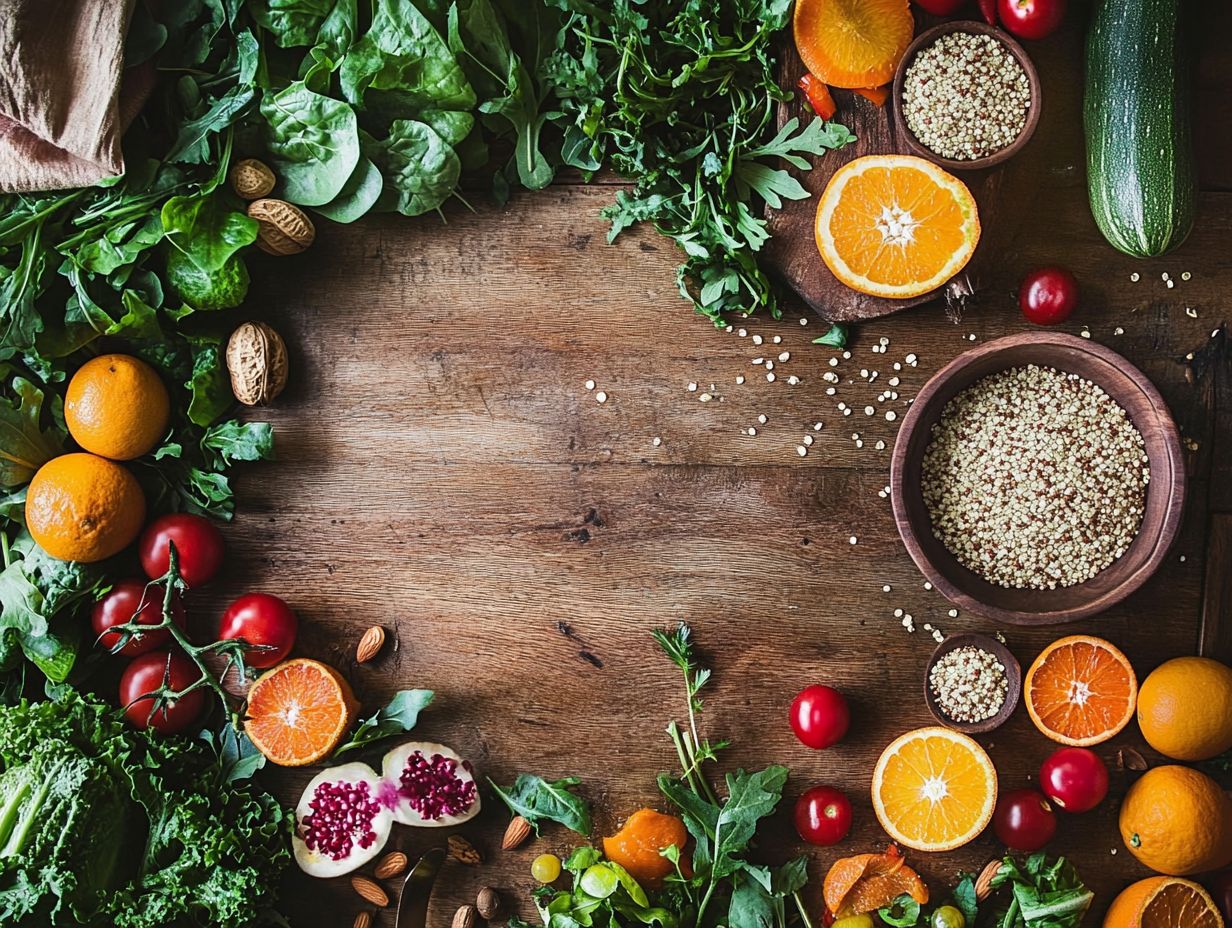
Transitioning to a plant-based diet can be an empowering journey for you, characterized by gradual changes and an emphasis on integrating more plant-based foods into your daily meals. It’s also important to learn about understanding food sensitivities and holistic nutrition to support your dietary changes effectively.
To navigate this transition successfully, embrace practical tips and strategies for meal prep and planning that will not only streamline the process but also make it a delightful experience.
Tips and Strategies for Success
Transitioning to a plant-based diet can be exciting! Effective strategies include careful planning and creativity in meal prep.
Explore new recipes that highlight the versatility of plant-based foods. Emphasizing variety and flavor enhances your journey.
Develop a weekly meal plan to streamline your grocery shopping and minimize waste. Don t hesitate to try new recipes from community cookbooks or online forums.
Joining local groups focused on plant-based eating offers support and inspiration. Connect with others on this culinary adventure!
Plant-Based Recipes and Meal Ideas
Plant-based recipes offer a range of delicious and nutritious options for everyone. Explore cooked grains, vibrant vegetables, beans, legumes, and wholesome nuts.
These diverse possibilities can help you create satisfying meals that meet your dietary goals.
Delicious and Nutritious Meal Options
In plant-based cooking, you’ll find many tasty and healthy meal options. Enjoy the incredible flavors of legumes, grains, and colorful vegetables.
Cooking these meals supports your dietary choices and boosts your health. Picture a hearty lentil and vegetable stew on a chilly evening!
Or try chickpea salad wraps for a light lunch on a warm day. Quinoa bowls with roasted veggies and tahini dressing can elevate your brunch gatherings.
These meals are not just beautiful but also packed with essential nutrients. Embrace various spices and cooking techniques to make your meals exciting!
Frequently Asked Questions
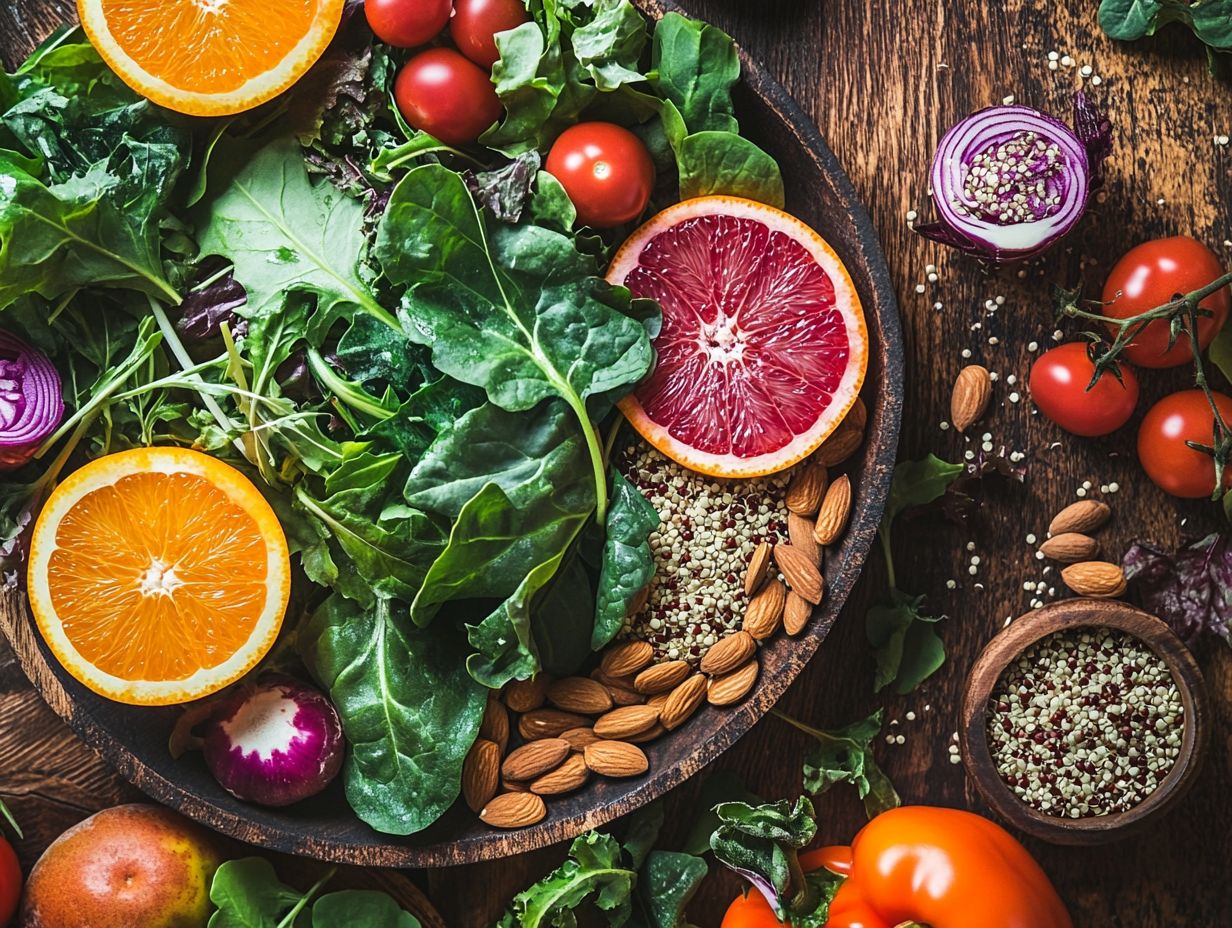
What is a plant-based diet?
A plant-based diet focuses on whole foods like fruits, vegetables, whole grains, beans, nuts, and seeds. It limits animal products like meat and dairy.
What is holistic nutrition?
Holistic nutrition looks at the whole person, including emotional and spiritual health. It stresses a balanced diet for overall well-being.
How can a plant-based diet benefit my health?
Research shows that plant-based diets can lower the risk of chronic diseases such as heart disease and diabetes. They are rich in fiber, vitamins, and antioxidants that support health.
Are there any potential downsides to a plant-based diet?
A plant-based diet isn t for everyone. Those with specific nutrient deficiencies should consult a healthcare professional before making major dietary changes.
What are some tips for transitioning to a plant-based diet?
Start by adding more plant-based foods to your meals. Gradually reduce animal products and experiment with different plant-based recipes.
Can I get enough protein on a plant-based diet?
Yes, you absolutely can get enough protein on a plant-based diet! Many foods like beans, lentils, tofu, tempeh, and quinoa are packed with protein.
To make sure you’re covering all your nutritional bases, eat a variety of plant-based foods. This way, you ll get all the building blocks your body needs to stay strong and healthy.



